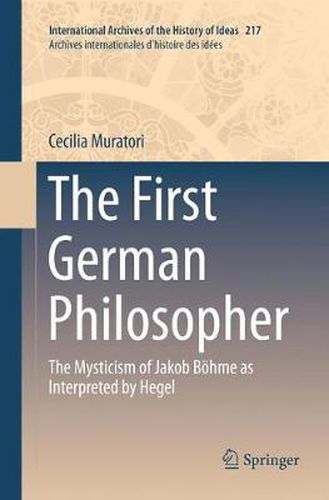Readings Newsletter
Become a Readings Member to make your shopping experience even easier.
Sign in or sign up for free!
You’re not far away from qualifying for FREE standard shipping within Australia
You’ve qualified for FREE standard shipping within Australia
The cart is loading…






This title is printed to order. This book may have been self-published. If so, we cannot guarantee the quality of the content. In the main most books will have gone through the editing process however some may not. We therefore suggest that you be aware of this before ordering this book. If in doubt check either the author or publisher’s details as we are unable to accept any returns unless they are faulty. Please contact us if you have any questions.
This book investigates Hegel’s interpretation of the mystical philosophy of Jakob Boehme (1575-1624), considered in the context of the reception of Boehme in the 18th and 19th centuries, and of Hegel’s own understanding of mysticism as a philosophical approach. The three sections of this book present: the historical background of Hegel’s encounter with Boehme’s writings; the development of two different conceptions of mysticism in Hegel’s work; and finally Hegel’s approach to Boehme’s philosophy, discussing in detail the references to Boehme both in published writings and manuscripts. According to Hegel, Boehme is the first German philosopher . The reason for placing Boehme at the very beginning of German philosophy is that Hegel considers him to be a profound thinker, despite his rudimentary education. Hegel’s fascination with Boehme mainly concerns the mystic’s understanding of the symbiotic relation between God and his opposite, the Devil: he considers this to be the true speculative core of Boehme’s thought. By interpreting Boehme, Hegel intends to free the speculative content of his thought from the limitations of the inadequate, barbarous form in which the mystic expressed it, and also to liberate Boehme from the prejudices surrounding his writings, placing him firmly in the territory of philosophy and detaching him from the obscurity of esotericism. Combining historical reconstructions and philosophical argumentation, this book guides the reader through an important phase in German philosophy, and ultimately into an inquiry about the relationship between mysticism and philosophy itself.
$9.00 standard shipping within Australia
FREE standard shipping within Australia for orders over $100.00
Express & International shipping calculated at checkout
This title is printed to order. This book may have been self-published. If so, we cannot guarantee the quality of the content. In the main most books will have gone through the editing process however some may not. We therefore suggest that you be aware of this before ordering this book. If in doubt check either the author or publisher’s details as we are unable to accept any returns unless they are faulty. Please contact us if you have any questions.
This book investigates Hegel’s interpretation of the mystical philosophy of Jakob Boehme (1575-1624), considered in the context of the reception of Boehme in the 18th and 19th centuries, and of Hegel’s own understanding of mysticism as a philosophical approach. The three sections of this book present: the historical background of Hegel’s encounter with Boehme’s writings; the development of two different conceptions of mysticism in Hegel’s work; and finally Hegel’s approach to Boehme’s philosophy, discussing in detail the references to Boehme both in published writings and manuscripts. According to Hegel, Boehme is the first German philosopher . The reason for placing Boehme at the very beginning of German philosophy is that Hegel considers him to be a profound thinker, despite his rudimentary education. Hegel’s fascination with Boehme mainly concerns the mystic’s understanding of the symbiotic relation between God and his opposite, the Devil: he considers this to be the true speculative core of Boehme’s thought. By interpreting Boehme, Hegel intends to free the speculative content of his thought from the limitations of the inadequate, barbarous form in which the mystic expressed it, and also to liberate Boehme from the prejudices surrounding his writings, placing him firmly in the territory of philosophy and detaching him from the obscurity of esotericism. Combining historical reconstructions and philosophical argumentation, this book guides the reader through an important phase in German philosophy, and ultimately into an inquiry about the relationship between mysticism and philosophy itself.